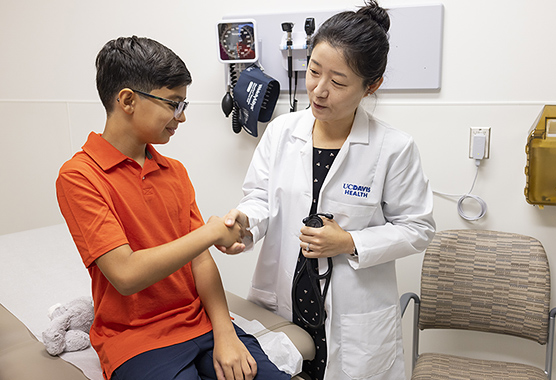Cystic Fibrosis
UC Davis Health specialists provide compassionate, comprehensive and evidence-based care for adults and children with cystic fibrosis.
Medically reviewed by Florence Chau-Etchepare, M.D. on April 16, 2024.

Accredited Care for Cystic Fibrosis
Experts at UC Davis Adult Cystic Fibrosis program provide compassionate care and the latest therapies. Our Cystic Fibrosis Foundation accreditation reflects our commitment to providing the treatments, education and support needed to manage this lifelong condition.
Children with cystic fibrosis receive expert care from pediatric pulmonologists at UC Davis Children’s Hospital. We help your child lead a full and active life.
What Is Cystic Fibrosis?
Cystic fibrosis is an inherited condition that causes thick, sticky mucus to build up in the lungs, pancreas and other organs. The condition affects breathing and nutrient absorption. It also increases the risk of serious respiratory (lung) infections.
Cystic fibrosis is a lifelong condition that’s present at birth. However, some people don’t learn they have the disease until adulthood. There isn’t a cure, but therapies can ease symptoms and provide a better quality of life.
Cystic Fibrosis Symptoms
Cystic fibrosis symptoms can be mild or severe. Symptoms tend to worsen with age.
Common Symptoms
Signs of cystic fibrosis include:
- Chronic cough or sinus infections
- Difficulty breathing, shortness of breath or wheezing
- Enlarged fingertips (clubbing)
- Failure to gain weight or grow (failure to thrive)
- Loose, oily stools
- Recurrent respiratory infections
Cystic Fibrosis Causes
Changes (mutations) to the cystic fibrosis transmembrane conductance regulator (CFTR) gene cause cystic fibrosis.
CFTR Gene Changes
Everyone has two copies of the CFTR gene. A person who has one mutated CFTR gene won’t have cystic fibrosis. As a carrier, they can pass the faulty gene to their children. A child must inherit two copies of a mutated CFTR gene — one from each parent — for cystic fibrosis to occur. It’s an inherited genetic condition.
Diagnosing Cystic Fibrosis
A newborn screening detects most cases of cystic fibrosis. A lab examines blood droplets taken from your baby’s heel 24 to 48 hours after childbirth.
Hospitals and birth centers in all 50 states and the District of Columbia perform newborn screenings to check for cystic fibrosis and other congenital conditions present at birth.
More than 3 in 4 cystic fibrosis diagnoses occur before age 2. But people with mild symptoms may not learn they have the condition until adulthood.
Our team uses these tests to diagnose cystic fibrosis:
Gene Test
This specialized blood test checks for the CFTR gene change that causes cystic fibrosis. Our program offers blood testing to assess for CFTR mutations.
Sweat Test
This test measures chloride levels in sweat, which is often higher in people who have cystic fibrosis.
Cystic Fibrosis Treatments
Our nationally accredited Adult Cystic Fibrosis program brings together the treatments and specialists needed for optimal health. Children receive expert care and customized treatment plans from pediatric cystic fibrosis specialists.
We have specialty pharmacists to help with medication refills, assessment of side effects, and monitoring. Our social workers can help patients and families navigate challenges that may arise, such as mental health screening, insurance issues, etc.
CFTR Modulator Drugs and Other Medications
CFTR modulator drugs target and correct the defective CFTR protein. You or your child must have a specific CFTR gene change for these drugs to work. Other medications include antibiotics for lung infections and inhaled bronchodilator medications to open airways.
Nutritional Counseling
Cystic fibrosis affects the body’s ability to break down and absorb nutrients and fats from foods. Our registered dietitians ensure you or your child get the nutrients to support body functions and prevent malnutrition.
Pancreatic Enzyme Supplements
Taking a pancreatic enzyme supplement with each meal helps your digestive system break down foods and absorb nutrients.
Respiratory Therapy
Our respiratory therapists teach airway clearance techniques that open the airways and clear mucus. You may also participate in our nationally accredited Pulmonary Rehabilitation program.
Clinical Trials
As a Cystic Fibrosis Foundation Therapeutics Development Network member, our team is active in the latest research and clinical trials. You or your child may benefit from promising new therapies still in development.
“Newborn Screening for CF,” Cystic Fibrosis Foundation, https://www.cff.org/intro-cf/newborn-screening-cf
“About Cystic Fibrosis,” Cystic Fibrosis Foundation, https://www.cff.org/intro-cf/about-cystic-fibrosis
In the United States
40KChildren and adults have cystic fibrosis
There are
1KNew cases of cystic fibrosis diagnosis in the U.S. each year
Source: Cystic Fibrosis Foundation: About Cystic Fibrosis
Request an Appointment
As Sacramento's No. 1 hospital, you'll benefit from unique advantages in primary care and specialty care. This includes prevention, diagnosis and treatment options from experts in 150 specialties.
Referring Physicians
To refer a patient, submit an electronic referral form or call.
800-4-UCDAVIS
Patients
Call to make an appointment.
Consumer Resource Center
800-2-UCDAVIS

Ranked among the nation’s best hospitals
A U.S. News & World Report best hospital in cardiology, heart & vascular surgery, diabetes & endocrinology, ENT, geriatrics, neurology & neurosurgery, and pulmonology & lung surgery.

Ranked among the nation’s best children’s hospitals
U.S. News & World Report ranked UC Davis Children’s Hospital among the best in pediatric nephrology, orthopedics*, and pulmonology & lung surgery. (*Together with Shriners Children’s Northern California)

Ranked Sacramento’s #1 hospital
Ranked Sacramento’s #1 hospital by U.S. News, and high-performing in aortic valve surgery, back surgery (spinal fusion), COPD, colon cancer surgery, diabetes, gynecological cancer surgery, heart arrhythmia, heart failure, kidney failure, leukemia, lymphoma & myeloma, lung cancer surgery, pacemaker implantation, pneumonia, prostate cancer surgery, stroke, TAVR, cancer, orthopedics, gastroenterology & GI surgery, and urology.

The nation’s highest nursing honor
UC Davis Medical Center has received Magnet® recognition, the nation’s highest honor for nursing excellence.

World-class cancer care
One of ~59 U.S. cancer centers designated “comprehensive” by the National Cancer Institute.

A leader in health care equality
For the 13th consecutive year, UC Davis Medical Center has been recognized as an LGBTQ+ Healthcare Equality Leader by the educational arm of America’s largest civil rights organization.

